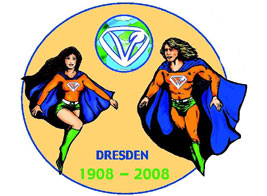
38th IVU World Vegetarian Congress - 100 Years of Food Revolution
A joint event of the International Vegetarian Union (IVU), and the Vegetarier-Bund Deutschlands e.V. (VEBU)

A Global Dietary Imperative to Global Warming
Outline |
-
Main Idea -
Background on Global Warming -
Animal Agriculture Impacts & Inefficiency -
Plant-based Diets, Status, Projections -
Steps to Solutions -
Conclusion / Resources |
Main Idea |
-
Human activities have changed the composition of the atmosphere and therefore are influencing the Earth's climate, particularly via global warming -
The burning of fossil fuels, such as coal and oil, and deforestation have caused the concentrations of heat-trapping greenhouse gases to increase significantly in our atmosphere -
Although rarely addressed by mainstream media, eliminating the production and consumption of meat and other animal products on a global scale is vital in reducing global warming and other grave environmental threats - Also benefits people's physical/mental/spiritual health
- Prevents the massive mistreatment and suffering of farmed animals as well as our effects on others
-
Moving to an-all-plant-based (Vegan) diet is perhaps the single greatest step we can take to reduce Global Warming. |
Global Warming Background |
-
Definition: an increase in the average temperature of the atmosphere near the Earth's surface and in the troposphere, which can contribute to changes in global climate patterns -
Refers more specifically to recent decades and the projected continuation of this increase -
Occurs from a variety of causes, both natural and anthropogenic (human-induced) -
Scientists are certain that human activities are changing the composition of the atmosphere and responsible for most of the warming in recent decades (*1) -
Global average air temperature near the Earth's surface rose 0.74 ± 0.18 °Celsius (1.3 ± 0.32 °Fahrenheit) in the last century (*2) |
Greenhouse Effect
Greenhouse Gases & Temperatures |
-
Any gas that absorbs infrared radiation in the atmosphere -
Greenhouse gases (compounds) include: water vapor (H2O), carbon dioxide (CO2), methane (CH4), nitrous oxide (N2O), chlorofluorocarbons (CFCs) etc, ozone (O3) -
Necessary for life as we know it… but increased concentrations result in increased temperatures on the Earth -
Every year since 1992 are the warmest global average temperatures on record; warmest are 1998 and 2005 -
If the concentration of greenhouse gases continues to increase, then by 2100, climate models referenced by the IPCC* predict that global temperatures are likely to increase by 1.1 to 6.4 °C (2.0 to 11.5 °F) above 1990 levels -
Global Dimming may be masking the real overall effect |
Global Temperatures
Global CO2 Emissions
Global Warming Resulting Changes |
-
An increase in global temperatures can in turn cause other changes: - rising sea level, flooding, submerged islands
- changes in the amount/pattern of precipitation
- increases in the frequency/intensity of extreme weather events; record heat, wildfires, droughts, shrinking lakes
- glacier retreat, permafrost melt, reduced summer streamflows
- acidification of the oceans
- destruction of wildlife habitats
- endangered species & extinctions
- poleward and upward shift of plant and animal ranges
- phenology (biological timing) e.g. earlier emergence of insects and egg-laying in birds
- changes in agricultural yields
- increases in the ranges of disease vectors
- environmental refugees
|
|
-
Intergovernmental Panel on Climate Change (IPCC) -
Body established in 1988 and comprised of two United Nations organizations - The World Meteorological Organization (WMO)
- The United Nations Environment Programme (UNEP)
-
Evaluates the risk of climate change brought on by humans, based mainly on peer reviewed and published scientific/technical literature -
Reports are widely cited and the panel is regarded as authoritative -
Climate Change 2007: The Fourth Assessment Report (Nov 2007) - Working Group I - The Physical Science Basis
- Working Group II - Impacts, Adaptation and Vulnerability
- Working Group III - Mitigation of Climate Change
- Synthesis Report - Summary for Policymakers
- Co-winner of 2007 Nobel Peace Prize
|
General Mitigation Strategies |
-
Mitigation Strategies for Global Warming - Conservation - reduction of ave energy use (per person);
- Population control (limit growth in number of people)
- Shift to alternative or renewable energy sources (bio-diesel, solar, wind, etc), away from carbon-based fossil fuels
- Carbon capture and storage, carbon sequestration (geo-engineering)
-
Governments, communities, religious institutions, schools, corporations, and other organizations to get actively involved as well as individual lifestyle and political action |
Specific Mitigation Strategy:
Plant-based Diets |
-
Plant-based diets on a large-scale are one significant means of mitigating global warming -
Any global solution requires a broad-based change in people’s consciousness and subsequently their personal behaviors, a key component of which is a shift to plant-based diets -
Dispel the myth that technology alone will solve each and every global problem -
Whereas technology changes can have negative side effects, positive dietary shifts are accompanied by a number of other important benefits, e.g. improved personal and public health, effect on animals, resource utilization efficiency, etc -
The significant body of information linking animal agriculture’s devastating effects in global warming, esp when western diets (e.g. SAD) are increasingly globalized, has generally been ignored or marginalized |
Inefficiency & Devastation of Animal Agriculture |
-
Animal Agriculture is an inefficient use of resources - Food IN to ‘Food’ OUT
- Water
- Land
- Energy
-
Animal Agriculture causes environmental devastation as a consequence - Land, water, air
- Manure / urine
|
Dietary Impact to Global Warming |
| |
Emissions from Animal Agriculture |
-
9 % of all carbon dioxide (CO2) emissions -
37 % of methane (CH4) emissions - CH4: 23 times global warming potential of CO2
-
65 % of nitrous oxide (N2O) emissions - N2O: 296 times global warming potential of CO2
-
Researchers at the University of Chicago found that the average American diet, including all food processing steps, produces an extra 1.5 tons of CO2-equivalent annually, compared to a meat-free diet |
Impact of Animal Agriculture |
-
Over 100 billion animals are reared worldwide to be killed and eaten annually -
Grain is inefficiently diverted to feed farmed animals (despite great hunger in many parts of the world) -
With fresh-water sources dwindling rapidly, we are using far more water than that required for completely plant-based diets -
Land use per person is greater for an animal-based diet than for a vegan diet -
Additional environmental and health problems -
Direct competition with other activities for scarce land, water, and other natural resources, e.g. conflicts arise over resources -
Demand in the developing world is projected to double meat and dairy production globally by 2050 (UN FAO) |
Resource Waste / Pollution |
-
10+ kg of Grain used to make 1 kg of feedlot beef -
20,000+ liters of Water needed to make 1 kg of feedlot beef; less than 1000 for most plant foods -
78 calories of fossil fuel are spent to produce 1 calorie of protein from feedlot beef; 2 calories needed for soybeans -
Over 3 acres of land to sustain an ave meat-eater; vegan diet may require only 10% of that -
~50 kg of wet manure produced per day for ave dairy cow |
|
-
Yields per acre in pounds of usable protein - Beef - 20
- Meat (all types) - 45
- Eggs - 78
- Milk - 82
- Wheat - 138
- Other legumes - 192
- Corn - 211
- Rice - 261
- Soybeans - 356
|
|
-
Pesticides, insecticides, antibiotics into ground, water, air…and food -
Mounds of manure + urine at feedlots & dairies; and animal flatulence… -
Pollution, and added pollution, to the air, waterways, and land from all the extra needs and inefficiency -
Rainforests destroyed for land to graze cattle, especially in third world countries; beef is exported to developed countries -
So even less ability for plant kingdom to absorb CO2 |
Numbers of Living Animals |
-
For animal consumption today, at any one time -
Humans ~ 6.5 Billion -
Cattle ~ 1.3 Billion (consume food calories of 8.7B) -
Pigs ~ 1 Billion -
Sheep and Goats ~ 1.8 Billion -
Chickens ~ 15.4 Billion |
Magnitude of Animals Killed |
-
In the UK - per year - ~1 Billion land animals
- > 2 Billion land + sea animals
-
In the US - per year - ~ 10.4 Billion land animals
- > 26 Billion land + sea animals
-
Worldwide - per year - > 55 Billion land animals
- > 100 Billion land + sea animals
- Over 3170 per second
|
Animal Consumption Growth |
- Meat in the past 40 years
- Europe: 56 to 89 kg per person / year (59 %)
- US: 89 to 124 kg per person / year (39 %)
- China: 4 to 54 kg per person / year (1250 %)
- From 1997 to 2020 (projected by UN FAO)
- Global meat demand increase by 56 %
- Global milk demand increase by 54 %
|
|
- In the UK
- ~5% or ~ 3 Million
- ~A few hundred thousand ethical vegans…and growing!
- In the US
- ~3% or upwards of 9 Million
- Several hundred thousand ethical vegans…and growing!
- In India
- 1/3 or ~350 Million
- Maybe a thousand ethical vegans… and the movement has started!
|
|
-
Life expectancy of cows - Normally: ~20 + years
- In factory farms: 4-5 years
-
Milk production drops ~age 4 so replace with a younger cow, because of high demand for milk -
Artificially inseminated to keep having babies and producing milk - the system feeds itself -
Law of averages - 1 male per 1 female birth -
Male cows for veal (live 16-18 weeks) or fattened for beef (live less than 2 years) -
Commodities; no real concern for their well-being, except generated profit |
Dairy-Beef-Leather Industrial Complex |
-
The dairy industry feeds the beef industry which feeds the leather industry -
The goal of each is profit, not concern for animal well-being beyond econometrics -
By consuming dairy products (or using leather), we bring the price of beef down; we are implicitly contributing to the profits and viability of the beef industry -
Tax dollars are needed to subsidize the extraordinary inefficiency -
In times of lesser beef consumption, continued dairy consumption drives the slaughter of cows -
Similar for Egg-Meat industrial complex |
|
-
Our planet is imperiled like never before (includes all non-human and human animals) -
Global Warming may eclipse all other issues of our time -
Ecological sustainability demands that we explore, incorporate, and promote all worthy solutions to the urgent problems of the day -
Diet is unifying and integrating for so many reasons |
Global Dietary Perspective |
-
“The human appetite for animal flesh is a driving force behind virtually every major category of environmental damage now threatening the human future - deforestation, erosion, fresh water scarcity, air and water pollution, climate change, biodiversity loss, social injustice, the destabilization of communities, and the spread of disease.” Worldwatch Institute “eating meat is like driving a huge SUV... a vegetarian diet is like driving a hybrid car, and... a vegan diet is like riding a bicycle” (unk) |
|
-
Individual (diet-related) - Take time to think about what we believe in, question ourselves, feel good about/reaffirm what we do today
- Learn the facts and late-breaking information, be open to new information and share that with others in a positive manner
- Give talks / presentations, write officials and media
- Seek inspiration from others and share our experiences to inspire others - Lead by example, be a shining light
- Promote in visible ways, whatever they may be, to make an effect in our spheres of influence, that is comfortable for us as individuals and also push the envelope for ourselves
- Make personal changes with sincere efforts to move on the spectrum towards an all-plant-diet - GO VEGAN
- Eat/buy fresh, local, organic or veganic, bulk / less packaged, unprocessed, GMO-free
- Volunteer / donate - your time, skill, ability to a local group for whatever they need… or give money to a worthy cause
-
Groups / Organizations - Expanded collective vision and continue to inspire members to promote all the reasons, esp environmental benefits
- Seek opportunities to coordinate and leverage the work of like-minded groups as much as possible; form and support coalitions, work with others since we are so limited in our resources
- Engage and ‘invest’ in the media; publicize widely
- Identify the right people and get onto the team; nurture and develop the right mindsets; invest in and help build the leaders of tomorrow
- Plan and encourage more forums for discussion and education
- Plan, strategize, measure, and constantly reassess our approaches, tactics, and campaigns, and in a larger context
- Be involved in the greater movement, support it, and share your ideas of success … AND Lessons-Learned
|


 Saurabh Dalal
Saurabh Dalal